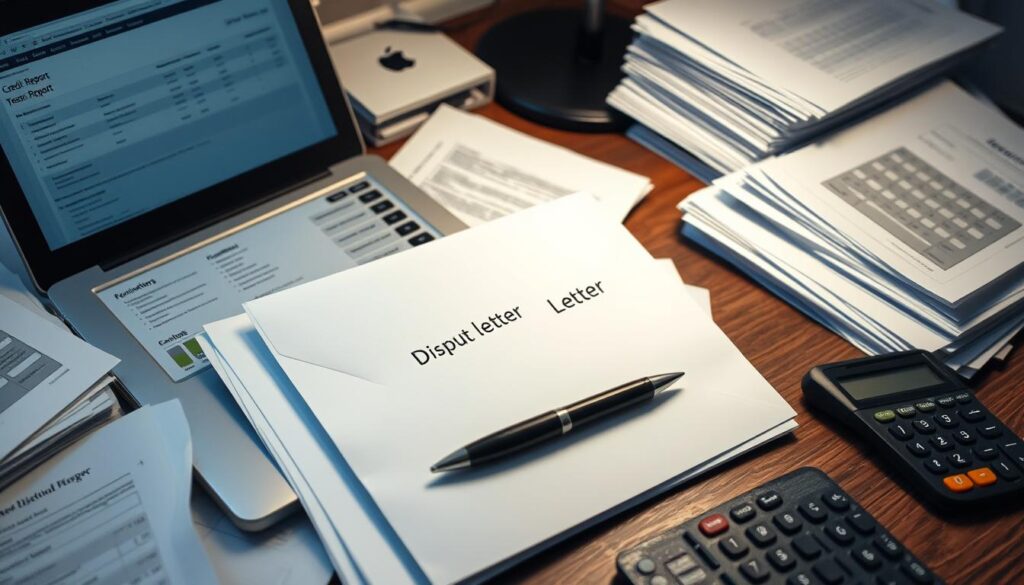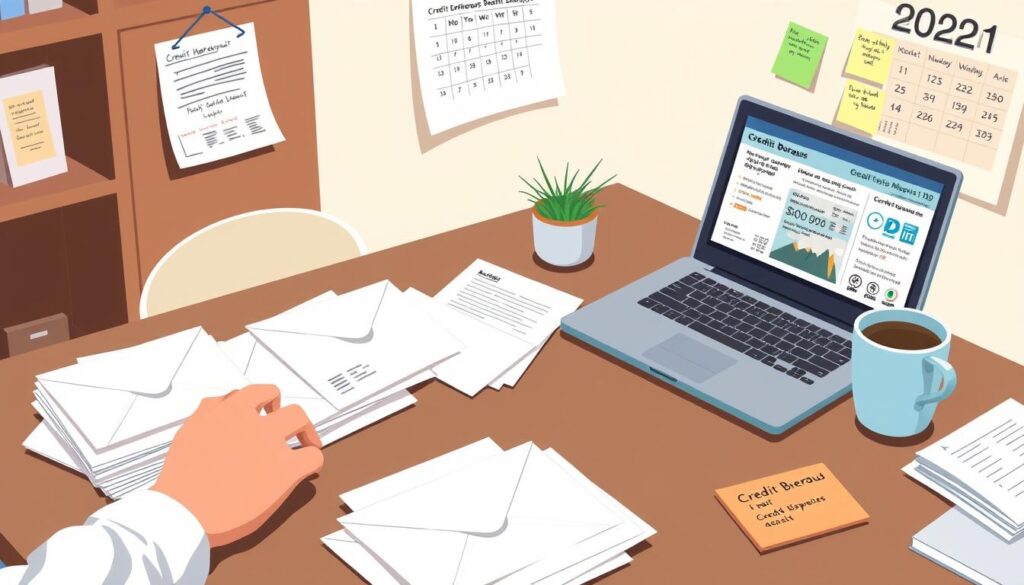Accurate credit reports are vital for your financial health. If you find errors, act quickly to dispute them with credit bureaus. This guide provides addresses for sending dispute letters to Experian, Equifax, and TransUnion.
Understanding the dispute process and having correct addresses helps you challenge errors effectively. This protects your credit score and ensures your report’s accuracy.
Key Takeaways
- Knowing the correct mailing addresses for the major credit bureaus is crucial when disputing errors on your credit report.
- The credit dispute process involves sending a letter to the appropriate credit bureau(s) detailing the inaccuracies and providing supporting documentation.
- Promptly addressing credit report errors can help improve your credit score and financial standing.
- Understanding the specific requirements and processes for each credit bureau can ensure your dispute is handled effectively.
- Maintaining the accuracy of your credit report is an ongoing responsibility that can have a significant impact on your financial future.
Understanding Credit Bureaus and Dispute Processes
Credit bureaus play a vital role in managing your financial reputation. They collect and compile information about your credit history and payment habits. Knowing how they work helps you handle credit disputes effectively.
What are Credit Bureaus?
Experian, Equifax, and TransUnion are the three major credit bureaus in the United States. They gather data from various sources to create your credit report. These reports help lenders, landlords, and employers assess your creditworthiness.
The Importance of Accurate Credit Reports
An accurate credit report is crucial for your financial health. Errors can lead to higher interest rates or loan denials. They might even cost you job opportunities.
By understanding the dispute process, you can fix errors on your report. This ensures your credit profile truly reflects your financial history.
Next, we’ll explore how to dispute credit report errors. You’ll learn how to contact credit bureaus and start the dispute process.
Preparing to Dispute Credit Report Errors
Disputing inaccuracies with credit agencies is vital for your credit report’s integrity. Gather essential documentation before starting the credit bureau dispute procedure. This step is crucial for supporting your case effectively.
Gathering Necessary Documentation
To dispute credit report errors, you’ll need specific documents. These include your current credit report from major credit bureaus. Also, collect bills and statements that show correct credit history information.
Gather any correspondence from the furnisher acknowledging the error. This company provided the incorrect information to the credit bureau. Their acknowledgment can strengthen your case significantly.
- A copy of your current credit report from each of the major credit bureaus (Experian, Equifax, and TransUnion). This will help you identify the specific errors or inaccuracies you need to address.
- Copies of any bills, statements, or other records that demonstrate the correct information about your credit history. These can serve as proof to counter the errors on your credit report.
- Correspondence or documentation from the furnisher (the company that provided the incorrect information to the credit bureau) acknowledging the error or committing to correct it.
With these documents, you’re ready to start the dispute resolution process. This preparation ensures your credit report accurately reflects your financial history. It also increases your chances of a successful outcome.

“Taking the time to carefully prepare your credit dispute will increase your chances of a successful outcome and help protect your financial well-being.”
credit bureau addresses for sending dispute letters
Knowing the correct mailing addresses for credit bureaus is vital when disputing credit report errors. The three main U.S. credit bureaus are Experian, Equifax, and TransUnion. Each has a specific address for dispute letters.
Here are the credit bureau addresses for sending dispute letters:
- Experian: Experian, P.O. Box 4500, Allen, TX 75013
- Equifax: Equifax Information Services LLC, P.O. Box 740256, Atlanta, GA 30374-0256
- TransUnion: TransUnion Consumer Solutions, P.O. Box 2000, Chester, PA 19016-2000
Include all relevant documents when submitting your dispute letter. This may include copies of your credit report and any correspondence with creditors. Any evidence that can help resolve the issue is important.
“Keeping your credit report accurate is essential for maintaining a healthy financial profile. Taking the time to dispute any errors can make a significant difference in your creditworthiness.”
Using the right addresses for dispute letters is crucial. It helps ensure your credit report’s accuracy. This step protects your financial well-being.
Experian Dispute Address
Disputing errors on your credit report is crucial. Knowing Experian’s mailing address is key to efficient corrections. The right address can speed up the process of fixing your credit report.
To start a dispute with Experian, send your letter and documents to:
Experian
P.O. Box 4500
Allen, TX 75013
This is Experian’s official address for credit report disputes. Sending your request here ensures prompt handling under Fair Credit Reporting Act rules.
Include relevant proof with your letter. Copies of your credit report and payment records can strengthen your case. These documents increase your chances of a good outcome.

Keep Experian’s address handy for future use. It helps maintain your credit report’s accuracy. Taking action to dispute errors protects your credit standing.
Equifax Dispute Address
Accurate credit reports are vital for your financial health. Equifax, a major U.S. credit bureau, plays a key role in maintaining this information. Disputing errors on your Equifax report is crucial for your financial well-being.
Specific Requirements for Equifax Disputes
To challenge errors on your Equifax credit report, send your dispute letter to:
Equifax Information Services LLC
P.O. Box 740256
Atlanta, GA 30374-0256
Include these details in your dispute:
- Your full name
- Your current address
- Your date of birth
- Your Social Security number
- A detailed explanation of the information you believe to be inaccurate
- Copies of any supporting documentation (such as payment receipts or statements)
Equifax has specific guidelines for dispute letters. Review these carefully before submitting your request. Following their instructions helps ensure efficient processing of your dispute.
A correct credit report is essential for your financial future. Errors can harm your credit score and limit your options. By addressing mistakes with Equifax, you protect your financial reputation.
TransUnion Dispute Address
Fixing errors on your credit report is vital for your financial health. TransUnion, the third-largest credit reporting agency in the US, has a specific address for disputes.
To start a dispute with TransUnion, send your letter and documents to:
TransUnion Consumer Dispute Center
P.O. Box 2000
Chester, PA 19016-2000
This is the general dispute address for TransUnion. For specific inquiries or follow-ups, you may need a different address. Check TransUnion’s website for the latest info on dispute submissions.
Use certified mail with a return receipt when sending your dispute. This gives you proof of delivery and a paper trail for future reference.
Accurate credit reports are crucial for a healthy financial profile. Fixing errors on your TransUnion report helps protect your credit. It’s a key step towards better financial well-being.
Additional Dispute Addresses
Credit report errors can be fixed by contacting specialty credit bureaus and furnishers. These additional dispute addresses help ensure your concerns are addressed thoroughly. Your credit report’s accuracy is crucial for financial health.
Specialty Credit Bureaus
Besides the major credit bureaus, specialty bureaus focus on specific credit types. These include ChexSystems, NCTUE, and PRBC.
If you spot errors related to these bureaus, contact them directly. Use their specific dispute addresses to resolve any issues.
- ChexSystems (for bank account history)
- NCTUE (for telecom and utility payment history)
- PRBC (for alternative credit data)
Furnisher Dispute Addresses
You may need to dispute inaccuracies with companies that provided information to credit bureaus. These “furnishers” include creditors, lenders, and other organizations reporting your credit history.
Find furnisher dispute addresses on your credit report or by contacting the company directly. Addressing errors with furnishers helps maintain an accurate credit history.
Drafting an Effective Dispute Letter
A well-structured dispute letter is vital for challenging credit report inaccuracies. Key elements in your letter can boost the success of your credit bureau dispute process.
Key Elements of a Dispute Letter
An effective dispute letter should focus on these important components:
- Clear Identification of Errors: Pinpoint specific errors on your credit report. Explain the issues you’ve found clearly and briefly.
- Supporting Documentation: Include relevant documents that back your claim. These might be payment records or correspondence with creditors.
- Request for Investigation and Correction: Ask the credit bureau to investigate and fix any inaccuracies. State your expectations clearly, like removing wrong information.
- Contact Information: Provide your full name, address, and other contact details. This helps the credit bureau communicate with you effectively.
These key elements create a compelling dispute letter. They increase your chances of resolving how to dispute credit report errors and navigating the credit bureau dispute procedure.
“A well-crafted dispute letter is the foundation of effectively disputing inaccuracies with credit agencies and navigating the credit bureau dispute resolution process.”
Thorough documentation is crucial when disputing credit report errors with credit bureaus. A comprehensive dispute letter can significantly improve your chances of success.

Sending Dispute Letters via Certified Mail
Submitting dispute letters via certified mail is vital for the credit bureau dispute procedure. This method ensures proper documentation and provides a paper trail for future reference. It’s a key step in the credit bureau dispute resolution process.
Certified mail serves several important purposes in the dispute process. It offers proof of delivery and establishes a clear timeline for the credit bureau’s response.
This method also helps if you need to escalate the issue. It’s a small investment that safeguards the integrity of your dispute procedure.
- Provides Proof of Delivery: The certified mail receipt proves the credit bureau received your dispute letter. This evidence is crucial if a dispute isn’t properly addressed.
- Establishes a Timeline: The delivery date creates a clear timeline for the bureau’s response. This helps you track the dispute credit information by mail process effectively.
- Facilitates Escalation: If the bureau fails to investigate or resolve your dispute, you can use the receipt to escalate the issue.
Using certified mail ensures your concerns are properly documented and addressed. It provides necessary documentation to navigate the credit bureau dispute resolution process successfully.
“Sending your dispute letters via certified mail is an essential step in the credit bureau dispute process, ensuring your concerns are properly documented and addressed.”
Following Up on Disputes
Disputing credit report errors is just the start. Following up is key to resolving issues. Track your disputes and take action if needed.
Tracking Dispute Progress
Monitor your credit reports regularly after submitting dispute letters. Check if disputed items have been updated or removed. Get free credit reports yearly from each bureau.
Escalating Unresolved Disputes
If your initial dispute fails, take further steps. Submit more evidence or contact the information provider. You can also file a complaint with the CFPB.
- Gather new evidence to support your case and resubmit your dispute.
- Reach out to the furnisher directly to resolve the matter and request they update the information with the credit bureaus.
- File a complaint with the CFPB if the credit bureaus or furnishers fail to address the issue in a timely manner.
Keep pushing for accurate credit reports. It’s crucial for your financial health. Track progress and escalate issues when needed.

Maintaining Credit Report Accuracy
Keeping your credit report accurate is an ongoing task. Regular checks are crucial for your financial health. Monitor your report to protect your financial well-being.
Review your credit report every 6 to 12 months. This helps spot new errors or changes quickly. Prompt action prevents negative impacts on your credit score.
If you find new errors, follow the dispute process again. Gather needed documents and contact the credit bureaus. Follow up on your dispute’s progress.
- Review your credit report regularly, at least once a year.
- Promptly address any new inaccuracies or changes in your credit report.
- Follow the established dispute process to correct any errors.
- Stay informed about your credit report and credit score to maintain long-term financial health.
Stay alert and take action to keep your credit report accurate. This protects your financial reputation and avoids potential problems. A clean credit report builds a strong financial future.
“Keeping your credit report accurate is an ongoing responsibility, but it’s one that pays dividends in the long run.”
Seeking Professional Assistance
The credit bureau dispute process can be tricky. Sometimes, getting help from a credit repair expert is a smart move. This is especially true for complex credit issues or when you’re stuck in the dispute process.
When to Consult a Credit Repair Professional
A credit repair pro can help if you’re struggling with disputes. They know the ins and outs of the credit bureau dispute procedure and credit bureau dispute resolution process.
These experts can guide you through tricky credit situations. They’re particularly helpful with identity theft, collections, or bankruptcy issues. Their know-how can boost your overall credit profile.
- Complex credit issues that you’re unable to resolve on your own
- Difficulties in the credit bureau dispute procedure or credit bureau dispute resolution process
- Identity theft, collections, or bankruptcy concerns
- Desire for a comprehensive credit improvement strategy
A credit repair pro can help you tackle inaccuracies head-on. They’ll ensure your credit report is spot-on. This can lead to a stronger financial future and better opportunities.
Conclusion
We’ve explored key steps for disputing credit report errors. This guide covers credit bureaus, the dispute process, and sending letters to the right addresses. These details are crucial for protecting your financial health.
A good credit report is vital in today’s money world. It affects your ability to get loans, credit cards, and even jobs. Take charge of your financial future by fixing any mistakes on your report.
You have the power to correct credit report errors. Follow this guide to dispute mistakes with credit agencies effectively. Keep good records of your efforts. Don’t be afraid to ask for help if needed.
A clean credit report can open doors to better financial opportunities. Stay alert and take action to ensure your report is accurate. Your financial future depends on it.

